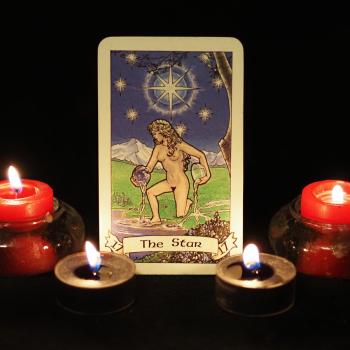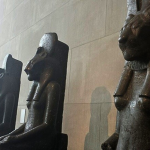Just before the Solstice I came across this story about two atheists who led a project to develop an atheist version of the Ten Commandments. I didn’t have time to write about it then, but now that I’m back on a regular writing schedule I’d like to take a closer look at their final list.
Here are the “Ten Non-Commandments” with my comments.
1. Be open-minded and be willing to alter your beliefs with new evidence. Absolutely. The proper response to new evidence is to examine it fairly, not to deny it or twist it to fit your mythology and doctrines. If new facts mean you have to adjust your religious beliefs, what else can you do and maintain your integrity?
2. Strive to understand what is most likely to be true, not to believe what you wish to be true. This is good advice, but remember the words of astronomer Sir Arthur Eddington: “Not only is the universe stranger than we imagine, it is stranger than we can imagine.”
 3. The scientific method is the most reliable way of understanding the natural world. True. But sometimes people have experiences that science struggles to explain. And sometimes the magic just works.
3. The scientific method is the most reliable way of understanding the natural world. True. But sometimes people have experiences that science struggles to explain. And sometimes the magic just works.
4. Every person has the right to control of their body. Yes. Inarguably, unambiguously yes.
5. God is not necessary to be a good person or to live a full and meaningful life. For some, this is true. For others, living a full and meaningful life requires forming and maintaining relationships with the Gods. See #9 below.
6. Be mindful of the consequences of all your actions and recognize that you must take responsibility for them. This is a very Pagan concept. If you harm someone, don’t ask for forgiveness – make it right.
7. Treat others as you would want them to treat you, and can reasonably expect them to want to be treated. Think about their perspective. This is a variation on the Golden Rule, which is found in so many cultures it’s close to being a universal human concept.
8. We have the responsibility to consider others, including future generations. This is another modern Pagan concept our world desperately needs to learn.
9. There is no one right way to live. This should be obvious, but a quick look at our politics shows it isn’t.
10. Leave the world a better place than you found it. Again, this should be obvious, but it isn’t, and it’s worth emphasizing.
These commandments are a nice collection of maxims, proverbs, and guiding principles. They would be a good addition to any religion, and many of them can be found in various religions in one form or another. Other than the caveat about not discounting the value of religious experiences, I have no complaints with this list.
For many people, atheism seems to be about screaming “there is no God!” But as I keep saying about Paganism, religion isn’t just about what you believe (or don’t believe), it’s about how you live. “There is no God!” may be a necessary starting point for some, but sooner or later we need to stop defining ourselves by who we aren’t and start defining ourselves by who we are.
Saying you don’t believe in Gods doesn’t say anything about how you live your life. Are you a non-theistic Pagan who likes myth and ritual but who sees the Gods as metaphors and nothing more? Are you a non-theistic Christian who tries to follow the teachings of Jesus but who sees him as a mortal human and nothing more?
Many atheists claim they have no religion (“don’t capitalize atheism – it isn’t a religion”) but as this project shows, there seems to be a need for many of the things religion provides. It appears to me, as a casual but not entirely disinterested observer, that atheism is becoming Atheism, and some Atheists are trying to figure out what they’re for and not just what they’re against.
Ultimately, that’s a matter for atheists and Atheists to decide, and I wish them well in their efforts.
I find it interesting, though, that for what they hoped would be a major contribution to the atheist movement, the organizers of this project chose to use a Christian theme (I know – the Ten Commandments come from the Hebrew Bible, but 99% of what I hear about them comes from Christians, not Jews). For all the Religious Right likes to rant about the marginalization of Christianity, it still dominates American culture.
What would be the Pagan Ten Commandments?
That’s not a relevant question in Pagan and polytheist circles. The idea of shortcuts on how to make moral decisions can be helpful and there are good examples from our ancient ancestors, most notably the Maxims of the Temple of Delphi. But wisdom sayings and statements of belief (“keep these things in mind”) are very different animals from commandments and rules (“thou shalt not”).
Rules and laws make things simple and predictable – and they make it easy to punish those who don’t comply. Most of the time that works out OK – “thou shalt not kill” is a pretty good idea no matter where it comes from. I just wish our society would apply that commandment to those in power as well as to ordinary people. But an overemphasis on rules leads to making decisions based on actions rather than consequences, and to acquiescing to authority rather than doing the hard work of thinking about what you’re doing and what is likely to come of it.
Rather than rules to follow, many Pagans emphasize virtues to exemplify. In a moral quandary, the wisest approach is to find the relevant virtues and figure out how best to embody them. This isn’t easy, as I found out last summer when I looked for a clear solution to our immigration problems. But considering it was unworkable rules that got us into this mess in the first place, I’m convinced that at the very least, virtues are a more honest approach than commandments.
Sometimes what we need isn’t new rules, or fewer Gods, or more Gods. Sometimes what we need is a completely different approach to how we think and how we live.
I think this group of atheists did a good job at developing their own Ten Commandments, but I have no desire for Pagans to copy them.
















